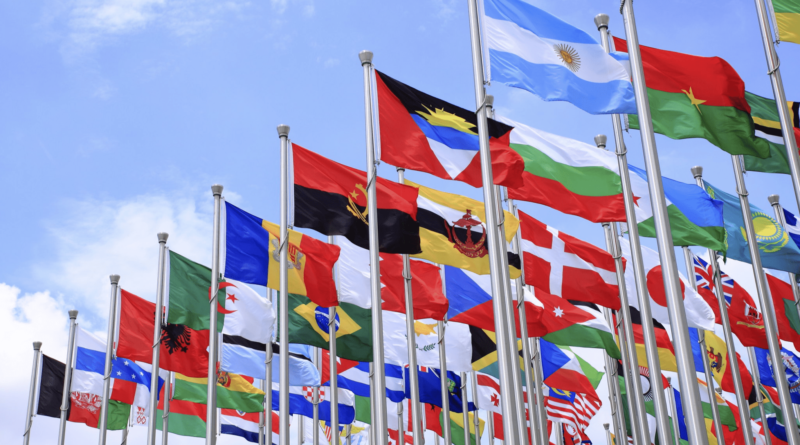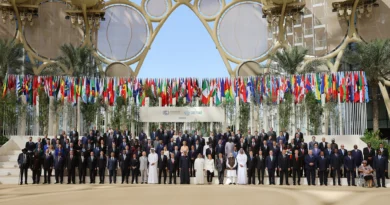When “internationalism” becomes a dirty word
Neoconservatives and liberal interventionists have perverted the term into primacy and global power projection of the worst kind.
DANIEL LARISON
There are few words in contemporary foreign policy debates that are more abused than “internationalist.” Internationalism should refer to an approach to foreign policy that prioritizes the peaceful resolution of conflicts, respect for international law, strengthening international institutions, and renouncing coercive policies to the extent possible.
However, as it is used today in Washington, internationalism often means almost exactly the opposite. This is a euphemism that advocates of American “leadership” use to describe their preferred policies of domination, imposing conditions on other states, and routinely using force or the threat of force to get their way. The label internationalist has become code for supporting militarism and interference in other countries' affairs, which is about as far from what it used to mean as possible.
The label internationalist is usually accompanied by the label “isolationist,” which is used to disqualify those who criticize US foreign policy. To be considered an internationalist in Washington, one has to feel comfortable supporting the extensive use of American power, including and especially the use of hard power. Expressing doubts or raising questions about the appropriateness or necessity of this broad use of power is one of the quickest ways to earn the label “isolationist.”
According to this distorted series of definitions, the so-called internationalists are those who try to impose Washington's will on other nations, while the “isolationists” are those who respect their rights and sovereignty. Even generally hawkish presidents will be accused of “isolationist” leanings if they “fail” to order military action somewhere, as we saw with Barack Obama and the redlining episode in 2013. Meanwhile, presidents will be praised for their “internationalism.” ” when they order illegal attacks.
It is common for analysts to confuse support for American primacy with internationalism. Earlier this year, Foreign Policy magazine published a long article by Ash Jain in which he classified the different fields of foreign policy and put them under the headings of “internationalist” or “non-internationalist.” In one of the strangest examples of how this worked, the “unilateral internationalists,” represented by people like John Bolton and Dick Cheney, were included among the internationalists because they were champions of power projection, but the moderates were considered “non-internationalists.” because they favored fewer commitments and a less ambitious global strategy.
Nothing could better demonstrate how absurd the contemporary use of the term “internationalist” has become when someone like Bolton, who has a history of contempt for international law and institutions, can be considered an internationalist, while defenders of international law cannot. they are.
The fusion of support for primacy with internationalism dates back to the reshaping of American foreign policy in World War II. As Stephen Wertheim explained in Tomorrow the World: The Birth of US Global Supremacy, “officials and intellectuals redefined armed supremacy as the epitome of internationalism and the core of international organization.” That redefinition was made because internationalism had meant something profoundly different in the past. Unfortunately, the redefinition stuck and the older concept of internationalism fell into oblivion.
This has had serious long-term consequences for American foreign policy. The distortion of internationalism into a project of global power projection fueled the worst impulses of American policymakers. As Wertheim explained, “installing self-control in the name of internationalism is something else. In fact, it makes the military supremacy of a nation the prerequisite for a decent world. This type of internationalism denies that armed force can hinder cooperation and provoke others. It also attenuates the value of international standards and organizations.”
Such a deformed and militarized internationalism will not be a stabilizing force, but will often become a threat to the international peace and security that its supporters claim to defend.
As long as the world's leading power refuses to respect the limits of international law, it will always be a destabilizing force in the world and will contribute to future conflicts. A principled, internationalist approach to the world requires that the United States not only respect the laws it expects others to respect, but also hold itself and its customers to the highest standards. Any attempt to establish exceptions or create loopholes for the United States and its aligned states will serve to undermine international law and encourage further violations.
That is what is happening right now with the Gaza war, as the United States flouts international law by allowing a devastating military campaign that has already killed more than 10.000 civilians.
Many self-proclaimed internationalists are quick to invoke international law and the UN Charter when it comes to the actions of America's adversaries, but then become suddenly mute when a US-backed government begins to trample on the same things. Advocates of the “rules-based order” clearly do not believe that international law applies to the United States and the governments it arms and supports, and they have no intention of doing anything to hold violators accountable. If the United States is going to take international law seriously, it can't keep doing this. Washington should not play favorites by giving some states free rein to commit terrible crimes.
The United States would benefit greatly from regaining a genuinely internationalist approach to the world. It would still be deeply engaged around the world through trade and diplomacy, but would have a much less militarized and less coercive foreign policy. Because you would take sides in very few conflicts, you would be in a stronger position to act as an effective and trusted mediator in any conflict that arose.
If the United States got used to respecting international law and did not selectively trample on it when it suited it, it would probably find a much more receptive audience in foreign capitals when asking for their support in a conflict. The United States would not isolate itself from the world, but neither would it become overcommitted or constantly involved in wars, whether its own or those of its clients.
Recovering an internationalism that values peace and cooperation rather than the pursuit of domination and rivalry is crucial for the United States to confront the global threats of pandemics and climate change in the coming decades. The United States and the other nations of the world cannot afford to waste this century in fruitless struggles for supremacy. To do this, Americans must rediscover the internationalist tradition that flourished in this country a century ago.









